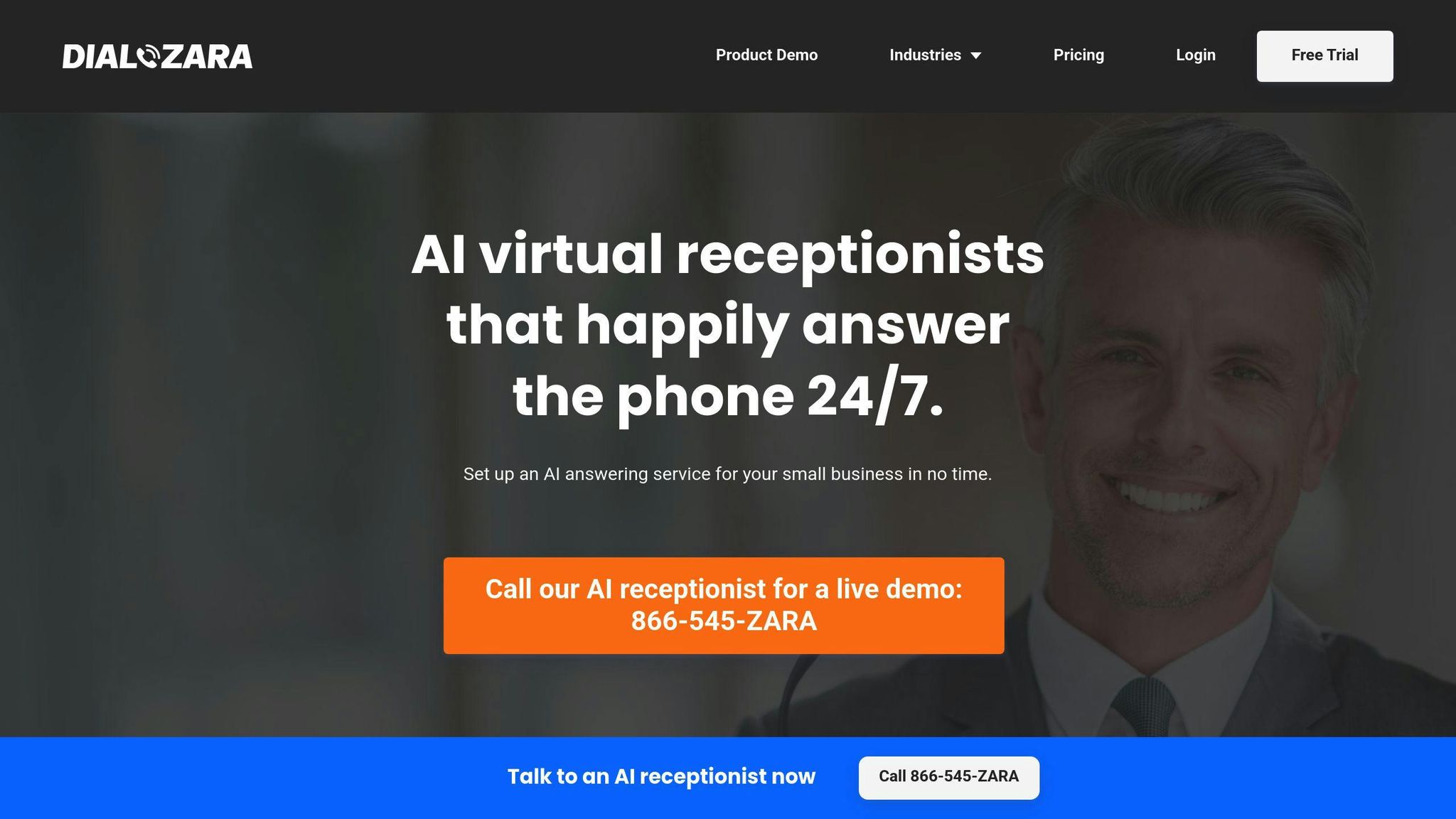
AI in Healthcare: Improving Patient Communication
AI helps healthcare providers communicate clearly with patients and offer round-the-clock support, cutting physician administrative work by up to 40%.

Written by
Adam Stewart
Key Points
- Turn complex medical terms into plain language patients actually understand
- Offer consistent patient support in multiple languages, day and night
- Connect AI systems to patient records for personalized responses
- Cut admin tasks so doctors spend more time with patients
AI is transforming healthcare communication by simplifying medical jargon, providing 24/7 support, and creating personalized, culturally aware interactions. Here's how:
- Improved Clarity: AI tools like NLP break down complex medical terms into plain language, enhancing patient understanding.
- Personalized Assistance: Systems analyze patient data to tailor advice, track recovery, and send reminders.
- 24/7 Support: Chatbots and virtual assistants address inquiries instantly, reducing wait times and easing physician workloads.
- Multilingual Support: AI adapts communication to different languages and cultural contexts, ensuring inclusivity.
- Efficient Workflows: Integrated tools draft empathetic messages and manage routine tasks, helping providers focus on critical care.
Quick Comparison of AI Tools in Healthcare Communication:
| AI Tool | Purpose | Benefit |
|---|---|---|
| EHR AI | Drafts patient messages | Reduces doctor workload |
| Text-based Chats | Tracks patient progress | Improves recovery monitoring |
| Virtual Assistants | Provides 24/7 assistance | Delivers instant responses |
| Dialzara | Handles voice communication | Automates calls, scheduling |
While AI enhances communication, challenges like data privacy and accessibility must be addressed to ensure equitable and secure healthcare for all.
Ways AI Improves Patient Communication
Northwell Health uses AI-powered text chat services to keep track of chronic conditions and post-surgery recovery. These systems provide personalized support by considering each patient's medical history.
AI Tools for Better Communication in Healthcare
Hospitals and clinics are adopting advanced AI tools to manage routine patient interactions more efficiently. For example, UC San Diego Health uses AI to draft thoughtful and detailed responses, easing the mental burden on physicians. This system works seamlessly with their Epic Systems electronic health record to maintain high communication standards.
| AI Tool | Purpose | Benefit |
|---|---|---|
| EHR AI | Drafts patient messages | Reduces workload for doctors |
| Text-based Chats | Tracks patient progress | Improves recovery monitoring |
| Virtual Assistants | Provides 24/7 assistance | Delivers instant responses |
These tools are also transforming how healthcare providers connect with patients by making interactions more tailored and engaging.
Using AI for Personalized Patient Interactions
AI analyzes patient data to create customized communication, helping patients better understand their health and make smarter decisions.
"AI doesn't get tired, so even at the end of a long day, it still has the capacity to help draft an empathetic message while synthesizing the request and relevant data into the response", says Dr. Marlene Millen, chief medical information officer for ambulatory care at UC San Diego Health.
AI stands out in its ability to:
- Provide health advice tailored to individual medical histories.
- Simplify medical language for clear, consistent communication.
- Offer responses that are culturally sensitive and appropriate.
Research at UC San Diego Health highlights how AI generates compassionate, detailed messages, ensuring patients feel heard and supported, no matter how complex their concerns are.
How AI Helps Patients Understand Health Information
AI is transforming how healthcare providers communicate with patients, especially when it comes to simplifying complex medical details. At UC San Diego Health, AI-powered systems are already being used to make medical information easier for patients to grasp, boosting overall health literacy.
Simplifying Medical Terms with AI
AI, particularly Natural Language Processing (NLP), is a game-changer for translating complicated medical jargon into plain, easy-to-understand language. This means patients can better comprehend their health information, no matter their background or level of expertise.
| Communication Aspect | Traditional Method | AI-Enhanced Method |
|---|---|---|
| Medical Information | Full of jargon, generic | Simplified, tailored explanations |
| Follow-up Instructions | Standardized handouts | Interactive, custom guidance |
UC San Diego Health’s AI system excels at simplifying terms while ensuring the information remains accurate and clear.
AI Tools for Better Health Education
AI platforms are reshaping patient education by offering more than just simpler language. They provide tailored, interactive learning experiences that adapt to individual needs.
These tools are especially useful in managing chronic conditions. For example, they can:
- Track patient health and send personalized reminders or alerts
- Offer interactive content to explain treatment plans in detail
- Provide health information in various languages for broader accessibility
Patients with limited health literacy or language challenges benefit significantly from these tools. By improving understanding, AI-driven platforms are paving the way for better, more accessible healthcare support.
AI Solutions for Healthcare Customer Service
Healthcare providers are increasingly using AI tools to improve patient communication and simplify customer service tasks. These technologies are changing the way medical facilities manage patient inquiries and administrative duties.
AI Chatbots for 24/7 Patient Support
Many healthcare facilities now rely on AI chatbots to handle patient questions and provide support at any time of day. These systems can respond instantly in multiple languages and even connect with patient health records to offer personalized assistance.
Some key advantages include:
- Shorter wait times, leading to happier patients
- Better accessibility for people from diverse backgrounds
- Tailored information, thanks to integration with patient history
At UC San Diego Health, AI tools assist in drafting patient responses, enabling more detailed and empathetic communication. This also helps reduce physician burnout by lightening their workload.
Dialzara: Enhancing Voice Communication in Healthcare

While chatbots excel at text-based interactions, AI-powered phone systems like Dialzara focus on voice communication. These tools ensure patients get the help they need, no matter the channel. In healthcare, Dialzara supports clinics by:
- Managing large volumes of patient calls
- Automating appointment scheduling
- Addressing medical inquiries with natural-sounding AI voices
- Integrating smoothly with existing systems
Healthcare providers using Dialzara report faster response times and better patient experiences without compromising care quality. Its expertise in medical terminology and secure handling of sensitive information makes it an excellent fit for medical practices.
Research from the University of California San Diego School of Medicine highlights how AI tools improve communication quality and help reduce physician burnout. However, adopting these technologies requires addressing challenges like data privacy and accessibility to ensure their success.
sbb-itb-ef0082b
Challenges and Considerations for Using AI in Healthcare
AI has the potential to transform healthcare communication, but it comes with challenges that require careful attention to patient protection and equal access.
Protecting Patient Privacy and Data
For healthcare providers using AI tools, safeguarding patient data is a top priority. Compliance with HIPAA regulations demands strong security practices. Here are a few key steps:
- Use two-factor authentication for accessing AI systems.
- Ensure encrypted communication channels for transmitting patient data.
- Conduct regular audits and provide staff training on data security.
For example, UC San Diego Health uses strict data protocols within their Epic Systems to secure patient consent and maintain confidentiality. Establishing clear data policies like these is essential. Additionally, forming AI governance committees can help oversee ethical and technical compliance during implementation.
While protecting data is crucial, ensuring that AI tools are accessible to all patients is equally important.
Making AI Accessible for All Patients
AI tools must be designed to serve diverse patient needs, regardless of language, digital skills, or economic background. The table below highlights common accessibility challenges and potential solutions:
| Challenge | Solution | Implementation Example |
|---|---|---|
| Language Barriers | Multi-language AI support | Real-time translation capabilities |
| Digital Literacy | User-friendly interfaces | Voice-activated and assistive features |
| Economic Access | Free/low-cost options | Collaborations with public health services |
| Disabilities | Assistive technologies | Features like voice commands and screen readers |
To further ensure fairness, healthcare providers should regularly evaluate AI tools for bias and effectiveness. This can involve testing with diverse groups and gathering feedback to refine accessibility features.
Conclusion: The Role of AI in Healthcare Communication
AI is changing the way healthcare providers connect with patients, offering faster and more effective communication while still prioritizing a personal approach to care.
Here’s where AI is making the biggest impact:
- Boosting Provider Efficiency: AI tools help maintain consistent communication quality, even during busy times, by turning patient data into actionable, empathetic responses. This not only keeps communication standards high but also helps reduce provider fatigue.
- Making Medical Information Clearer: AI simplifies complex medical jargon, making it easier for patients to understand their diagnoses and treatments. When patients grasp their health information better, they’re more likely to follow treatment plans and see improved outcomes.
- 24/7 Support: AI tools handle routine tasks like answering common questions and scheduling appointments around the clock. This means patients get timely help, and healthcare teams can focus on more critical cases.
A study from the University of California San Diego School of Medicine, published in April 2024, found that AI-generated messages are often longer and better in quality, signaling a positive shift in communication standards. By automating administrative tasks, these tools allow healthcare providers to spend more time on direct patient care.
The future of healthcare lies in combining AI’s efficiency with human empathy. While AI continues to advance, its success will depend on addressing challenges like data privacy and ensuring everyone has access to these tools.
FAQs
What is the best medical AI tool?
The ideal medical AI tool depends on what your healthcare communication needs are. Evaluations from 2024 have spotlighted some standout options:
For Patient Communication: Dialzara is a top choice for automating patient interactions and scheduling appointments. Its AI-powered virtual phone service uses natural voice technology and healthcare-focused features to streamline communication while reducing administrative tasks.
For Personalized Care Management: Tempus stands out by leveraging AI to tailor chronic disease management and enhance patient outcomes through advanced data analysis.
When deciding on an AI tool for healthcare communication, keep these key factors in mind:
- Compatibility with your existing systems
- Compliance with HIPAA and strong data security measures
- User-friendliness for both medical staff and patients
- Ability to scale as patient needs grow
- Cost-effectiveness and return on investment
Healthcare providers using tools like Dialzara have reported greater efficiency in patient communication while maintaining high service quality. These tools free up medical staff to focus more on direct patient care while ensuring professional and consistent interactions across all channels.
With so many options available, selecting the right AI solution requires aligning the tool's features with your organization's specific goals and needs.
Summarize with AI
Related Posts
AI in Healthcare: Balancing Patient Data Privacy & Innovation
Explore the benefits and risks of using AI in healthcare, along with strategies to balance patient data privacy and innovation. Learn how emerging technologies could shape the future of healthcare AI.
AI Virtual Receptionist Assistants: What You Need to Know
Discover how AI virtual receptionist assistants enhance customer service with 24/7 availability, cost savings, and efficiency for businesses.
AI Bridges Accessibility Gaps in Customer Service
Discover how AI bridges accessibility gaps in customer service by offering text-to-speech, simplifying complex information, non-standard speech recognition, image descriptions, and language translation. Learn about the benefits of AI for accessibility and how businesses can implement inclusive AI solutions.
How AI Improves Patient Data Analysis
AI is revolutionizing healthcare by enhancing patient data analysis for early disease detection, outcome prediction, and personalized treatment.
